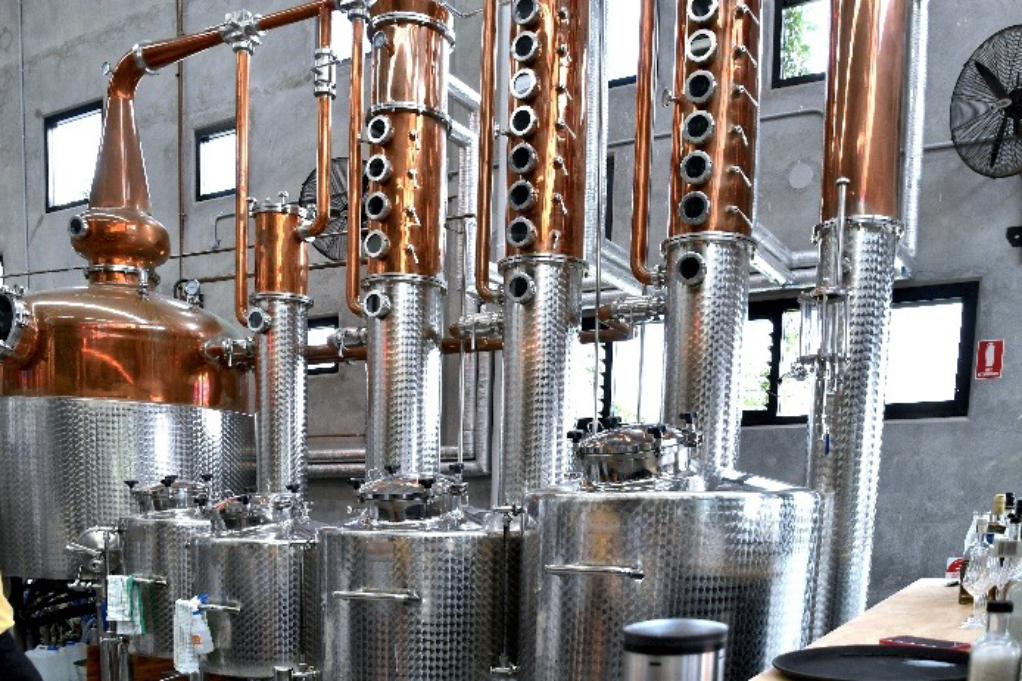Gin production is an ancient art that combines technical skills, sensory experience, and a deep understanding of raw materials and distillation processes. Over the years, various technologies have evolved to improve the quality and efficiency of production. Among these, the rotary evaporator is one of the most modern techniques that has gained popularity among craft gin distillers. But what are the advantages of this technology compared to traditional distillation techniques, such as pot still distillation?
In this article, we will explore the main benefits of the rotary evaporator in gin production and how it compares with conventional methods.
Low-Temperature Distillation
One of the main advantages of the rotary evaporator is its ability to distill at significantly lower temperatures compared to traditional methods. While a classic pot still requires high temperatures to evaporate alcohol and aromatic compounds, the Strike 100 Steroglass Rotary Evaporator utilizes reduced pressure to lower the boiling point of the liquid.
Benefits for delicate aromas
In gin production, botanical ingredients such as juniper, coriander, citrus, and delicate spices can be compromised by high temperatures, losing their most volatile aromatic qualities. With the rotary evaporator, distilling at lower temperatures allows for better preservation of the fragile and volatile components of botanical ingredients. The result is a gin with a fresher, more complex, and natural aromatic profile.
Greater control over sensory characteristics
Low-temperature distillation allows for the isolation of specific aromatic compounds that might otherwise be "cooked" or altered using traditional methods, enabling distillers to create unique aromatic profiles.
Energy efficiency
The rotary evaporator allows for energy savings compared to conventional distillation methods. The reduced boiling point means less energy is needed to heat the liquid. Additionally, the rotary evaporator operates continuously, eliminating the need for prolonged heating and cooling cycles.
Environmental benefits
This energy saving not only reduces operational costs but also has a positive environmental impact, contributing to a more sustainable gin production process.
Economic savings
The reduced energy use translates into lower operational costs, making the process economically advantageous, especially for small distillers who need to optimize every stage of production.
Greater control and flexibility in the process
The rotary evaporator offers very precise control over various distillation process parameters, including temperature, rotation speed, and pressure. This allows distillers to finely adjust the process to get the most out of the botanical ingredients.
Control of aroma concentration
With the Strike 100 Steroglass Rotary Evaporator, it is possible to manage the evaporation and condensation rates, achieving very precise aroma concentrations. This level of control is difficult to achieve with a traditional pot still, which may have wider variations in temperature and heat distribution.
Flexibility in production
Thanks to precise pressure control, it is possible to experiment with a wider range of raw materials, including those that would not otherwise withstand the high temperatures of traditional distillation. This opens new possibilities for product innovation, allowing for the creation of gin with less common or more sensitive botanicals.
Reduction of oxidation
In traditional distillation, prolonged exposure of botanical ingredients to high temperatures and air can promote oxidation processes, which can degrade the quality of the aromas.
Protection of aromas
The rotary evaporator, due to its ability to operate at low temperatures and under vacuum conditions, significantly reduces the risk of oxidation, ensuring that the ingredients maintain their original qualities. This results in a gin with a purer and more intense flavour.
Speed and repeatability
While pot still distillation can take several hours for each production cycle, a rotary evaporator completes the same process in much shorter times. The Strike 100 Steroglass Rotary Evaporator can produce up to 20 litres per hour of gin. Additionally, the accuracy and control of the rotary evaporator ensure that the final product is consistent from batch to batch.
Reduction in production times
The speed of the process is particularly advantageous for producers needing to produce gin on a craft scale but with high efficiency.
Standardization of quality
The ability to achieve consistent results is crucial in gin production, where slight variations in temperature or time can significantly alter the aromatic profile. The rotary evaporator ensures greater standardization of the product, eliminating many of the variables present in traditional distillation.
Versatility in base alcohol use
The rotary evaporator allows for working with a wide range of base alcohols, including less refined or lower-quality ones that might be unsuitable for conventional distillation methods. This enables producers to experiment with different base alcohols, adding an additional level of complexity to the final gin.
The rotary evaporator is establishing itself as an innovative technology in gin production, offering significant advantages over traditional distillation. Its ability to distill at low temperatures while preserving delicate aromas, greater energy efficiency, precise control over process parameters, and reduced risks of oxidation make the Strike 100 Steroglass Rotary Evaporator an excellent choice for craft gin producers seeking quality and innovation.


Despite the higher initial costs and the learning curve needed to master its use, the long-term benefits in terms of product quality and sustainability make the rotary evaporator an indispensable technology for those looking to push the boundaries of gin distillation.
